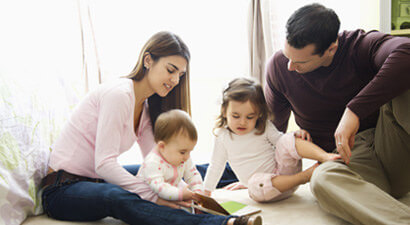Helping Your Children Cope With Divorce: 11 Steps


Written and verified by the psychologist Ana Couñago
When you decide that the healthiest thing for your family life is to end the relationship, you must help your children cope with divorce, face the difficulties, and assume the big changes that come after this situation.
Although the process isn’t easy, you can help them cope with divorce in a healthy way. If this is your case, put the following steps into practice and you’ll be able to lessen the negative impact of this situation.
How can you help your children cope with divorce?
The first thing will be how to break the news to them. It’s not easy, but it’s unavoidable. It’s best for both parents to be there, and, after communicating the irrevocable decision not to continue together as a couple, children need to understand and feel that they’re not to blame at all. You must make it clear that you and your ex-partner will do everything possible to carry out shared tasks and responsibilities with love and dedication.
1. Let them know that they’re loved by you and your ex-partner
It’s quite common for children to begin to feel responsible for their parents’ separation and to associate bad behavior or an unsatisfactory result at school with their parents’ breakup. To prevent this from happening, let them know that the causes of the separation have nothing to do with them and that parental love is still intact.
You might be interested in: How to Take Care of Yourself After a Divorce
2. Plan alternate activities
If your ex-partner is an inconsistent person and has already missed scheduled times with your children, plan special activities you can do with them so they won’t feel abandoned if the other parent can’t make it.
However, be sure to avoid making negative comments that affect your children’s opinion of their parent.
3. Give them enough confidence to communicate their feelings
When you stimulate this dimension in your children, you’ll prevent them from feeling frustrated and gradually building up resentment. Talk sincerely and openly with your children at all times so that they learn that it’s not wrong to communicate what they feel. If they don’t want to talk, ask them to write a letter or draw a picture.
4. Be prepared to answer important questions
Uncertainty will be the order of the day, so be prepared for natural, obvious, and, in some cases, unspoken questions. Your children will want to know with who they’re going to live with and how meetings or visits will take place.
Going to school, soccer, dance class, etc., are activities that shouldn’t be interrupted. However, the divorce will determine other dynamics. Be clear with your children about how those things will take place from now on.
Friends, appointments at home with schoolmates to do homework as a team, vacations, or the typical dates of family gatherings such as birthdays or Christmas, will have new characteristics.
Your children have the right and the need to know how things will be in order to assimilate them and should be part of certain decisions according to their age and maturity level.
5. Encourage closeness with other members of your family
Try to include other reliable and close family members in your family routines. If your children don’t have a mother or father figure present, another family member can give them a different vision of who they are and how they’d like to be in adulthood. It strengthens ties with people who can bring positive things into their lives.

6. Avoid arguing in the presence of your children
One of the keys to helping your children cope with divorce is to never let them see you arguing heatedly with your ex-partner. Find the right times to deal with contentious issues – your children shouldn’t be a part of it. Try to keep the relationship as cordial as possible.
7. Don’t predispose them or pressure them to have a preference for you
It’s important that once separated, you don’t try to get your children to take sides. Don’t expose the reasons for the separation if they’re present and you know that they could damage or affect the image of their parent. Try to always refer to your ex-partner with respect. If you think you can’t do it because the separation is too recent and you still feel angry, just don’t talk about it.
In this case, your children aren’t the right people to unburden yourself with because you’d only be adding unnecessary pressure to a situation that’s already difficult for everyone. They will have time to explain when they are ready.
8. Make them feel comfortable wherever they are
Whether they live with you or come to see you only on weekends or authorized days, provide them with a warm welcoming home and show them that they’ve come to a place where they’re welcome and loved. Seek to make the time you share with them enjoyable and of quality.
9. Don’t overload them with your worries
Don’t complain about family situations when you’re with your children. Children should be isolated from adult conflicts, so let them enjoy their childhood in the healthiest way possible. When they grow up, they’ll come to understand everything on their own. Preserve the positive image that your children have of you and your partner.
10. Take care of your health
It’s common knowledge that stress lowers the body’s defenses, and divorce is undoubtedly a stressful situation. So much so that experts observed that the divorce should be “addressed not only legally, but also at a health level, as it causes stress, panic, organizational problems, difficulties with socialization, etc.”
Make sure you eat healthy and get enough sleep. Make sure they have space for walking and daily exercise routines. You need health to face adversity and to carry out the transition with your children with integrity.
11. Accompany them in adapting to a new scenario
Always maintain an empathetic and supportive attitude with your children throughout the process. Even without telling you in words, they may be going through a time of insecurity, fear, and uncertainty that will be reflected in their socialization or school performance.
Be understanding and offer them support as they move through the acceptance stage and feel secure in this new way of relating to each other.
You may be interested in: Stages of Recovery After Divorce
Practical tips for parents facing a separation

- Avoid using your child as a way to vent your resentment toward the other person. Don’t channel your negative feelings by restricting the time you allow them to spend with their parent.
- Communicate with your ex-partner so that, despite the divorce, unanimous authority is maintained. Avoid contradicting each other so that discipline and rules work properly.
- Have a family conversation when it’s age appropriate to discuss certain issues. Explain what’s happening in simple terms and as positively as possible.
- If you see sudden changes in your child’s behavior, don’t hesitate to seek professional help. The intervention of a psychologist can guide you and indicate what steps you can take. In many cases, counseling from an outside person is required to help your children cope with the divorce.
- Stay calm so you can be a role model for your children. Before any action you take, you must be in good emotional health, you simply can’t give them balance that you don’t have.
Objective number one: Avoid violence
Each circumstance is different, but we must work to avoid violence at all costs. Maturity, good sense, and proper management of emotions become essential elements in order to go through a non-traumatic divorce process.
Agree on shared custody and, when necessary, go to family mediation; or else, accept specific technical advice. And if there are conflicts between the parents, avoid scenes and seek dialogue. If this isn’t possible, then the smartest thing to do is seek specialized help.
While divorce is common, conflict doesn’t have to be.
When you decide that the healthiest thing for your family life is to end the relationship, you must help your children cope with divorce, face the difficulties, and assume the big changes that come after this situation.
Although the process isn’t easy, you can help them cope with divorce in a healthy way. If this is your case, put the following steps into practice and you’ll be able to lessen the negative impact of this situation.
How can you help your children cope with divorce?
The first thing will be how to break the news to them. It’s not easy, but it’s unavoidable. It’s best for both parents to be there, and, after communicating the irrevocable decision not to continue together as a couple, children need to understand and feel that they’re not to blame at all. You must make it clear that you and your ex-partner will do everything possible to carry out shared tasks and responsibilities with love and dedication.
1. Let them know that they’re loved by you and your ex-partner
It’s quite common for children to begin to feel responsible for their parents’ separation and to associate bad behavior or an unsatisfactory result at school with their parents’ breakup. To prevent this from happening, let them know that the causes of the separation have nothing to do with them and that parental love is still intact.
You might be interested in: How to Take Care of Yourself After a Divorce
2. Plan alternate activities
If your ex-partner is an inconsistent person and has already missed scheduled times with your children, plan special activities you can do with them so they won’t feel abandoned if the other parent can’t make it.
However, be sure to avoid making negative comments that affect your children’s opinion of their parent.
3. Give them enough confidence to communicate their feelings
When you stimulate this dimension in your children, you’ll prevent them from feeling frustrated and gradually building up resentment. Talk sincerely and openly with your children at all times so that they learn that it’s not wrong to communicate what they feel. If they don’t want to talk, ask them to write a letter or draw a picture.
4. Be prepared to answer important questions
Uncertainty will be the order of the day, so be prepared for natural, obvious, and, in some cases, unspoken questions. Your children will want to know with who they’re going to live with and how meetings or visits will take place.
Going to school, soccer, dance class, etc., are activities that shouldn’t be interrupted. However, the divorce will determine other dynamics. Be clear with your children about how those things will take place from now on.
Friends, appointments at home with schoolmates to do homework as a team, vacations, or the typical dates of family gatherings such as birthdays or Christmas, will have new characteristics.
Your children have the right and the need to know how things will be in order to assimilate them and should be part of certain decisions according to their age and maturity level.
5. Encourage closeness with other members of your family
Try to include other reliable and close family members in your family routines. If your children don’t have a mother or father figure present, another family member can give them a different vision of who they are and how they’d like to be in adulthood. It strengthens ties with people who can bring positive things into their lives.

6. Avoid arguing in the presence of your children
One of the keys to helping your children cope with divorce is to never let them see you arguing heatedly with your ex-partner. Find the right times to deal with contentious issues – your children shouldn’t be a part of it. Try to keep the relationship as cordial as possible.
7. Don’t predispose them or pressure them to have a preference for you
It’s important that once separated, you don’t try to get your children to take sides. Don’t expose the reasons for the separation if they’re present and you know that they could damage or affect the image of their parent. Try to always refer to your ex-partner with respect. If you think you can’t do it because the separation is too recent and you still feel angry, just don’t talk about it.
In this case, your children aren’t the right people to unburden yourself with because you’d only be adding unnecessary pressure to a situation that’s already difficult for everyone. They will have time to explain when they are ready.
8. Make them feel comfortable wherever they are
Whether they live with you or come to see you only on weekends or authorized days, provide them with a warm welcoming home and show them that they’ve come to a place where they’re welcome and loved. Seek to make the time you share with them enjoyable and of quality.
9. Don’t overload them with your worries
Don’t complain about family situations when you’re with your children. Children should be isolated from adult conflicts, so let them enjoy their childhood in the healthiest way possible. When they grow up, they’ll come to understand everything on their own. Preserve the positive image that your children have of you and your partner.
10. Take care of your health
It’s common knowledge that stress lowers the body’s defenses, and divorce is undoubtedly a stressful situation. So much so that experts observed that the divorce should be “addressed not only legally, but also at a health level, as it causes stress, panic, organizational problems, difficulties with socialization, etc.”
Make sure you eat healthy and get enough sleep. Make sure they have space for walking and daily exercise routines. You need health to face adversity and to carry out the transition with your children with integrity.
11. Accompany them in adapting to a new scenario
Always maintain an empathetic and supportive attitude with your children throughout the process. Even without telling you in words, they may be going through a time of insecurity, fear, and uncertainty that will be reflected in their socialization or school performance.
Be understanding and offer them support as they move through the acceptance stage and feel secure in this new way of relating to each other.
You may be interested in: Stages of Recovery After Divorce
Practical tips for parents facing a separation

- Avoid using your child as a way to vent your resentment toward the other person. Don’t channel your negative feelings by restricting the time you allow them to spend with their parent.
- Communicate with your ex-partner so that, despite the divorce, unanimous authority is maintained. Avoid contradicting each other so that discipline and rules work properly.
- Have a family conversation when it’s age appropriate to discuss certain issues. Explain what’s happening in simple terms and as positively as possible.
- If you see sudden changes in your child’s behavior, don’t hesitate to seek professional help. The intervention of a psychologist can guide you and indicate what steps you can take. In many cases, counseling from an outside person is required to help your children cope with the divorce.
- Stay calm so you can be a role model for your children. Before any action you take, you must be in good emotional health, you simply can’t give them balance that you don’t have.
Objective number one: Avoid violence
Each circumstance is different, but we must work to avoid violence at all costs. Maturity, good sense, and proper management of emotions become essential elements in order to go through a non-traumatic divorce process.
Agree on shared custody and, when necessary, go to family mediation; or else, accept specific technical advice. And if there are conflicts between the parents, avoid scenes and seek dialogue. If this isn’t possible, then the smartest thing to do is seek specialized help.
While divorce is common, conflict doesn’t have to be.
All cited sources were thoroughly reviewed by our team to ensure their quality, reliability, currency, and validity. The bibliography of this article was considered reliable and of academic or scientific accuracy.
- Amorós, M. O., Espada, J. P., & Piñero, J. (2007). Intervención psicológica con hijos de padres separados: Experiencia de un Punto de Encuentro Familiar. Anales de Psicología/Annals of Psychology, 23(2), 240-244. https://revistas.um.es/analesps/article/view/22361
- Bolívar Martín, P. M. (2017). Los niños ante la ruptura parental. Universidad de Granada. https://digibug.ugr.es/handle/10481/46215
- Comunidad de Madrid. (2017). ACTUACIÓN DE LOS CENTROS EDUCATIVOS ANTE LOS PROGENITORES DIVORCIADOS/ SEPARADOS QUE COMPARTEN LA PATRIA POTESTAD.
- Fariña, F., & Ramón, A. R. C. E. (2006). El papel del psicólogo en casos de separación o divorcio. Future of Children, 4(143), 164.
- Larrosa Domínguez, M., López Estela, S., Tejada Musté, R., & Vives Relats, C. (2019). Análisis del proceso de divorcio como transición de salud según la teoría de las transiciones de Alaf Meleis. https://rua.ua.es/dspace/bitstream/10045/96324/1/CultCuid_54-266-272.pdf
- Marin, M. A. (2010). Divorcio conflictivo y consecuencias en los hijos: implicaciones para las recomendaciones de guarda y custodia. Papeles del psicólogo, 31(2), 183-190. https://www.redalyc.org/pdf/778/77813509004.pdf
This text is provided for informational purposes only and does not replace consultation with a professional. If in doubt, consult your specialist.








